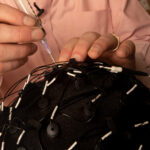
When Dr. Crystal Bennett began her dance-based research, she’d hoped to improve her subjects’ physical fitness. But she soon discovered that there were other benefits she hadn’t considered.
Bennett, lecturer of nursing at the University of West Florida, was looking for a fun way to help elderly people get more active.
“My original research was looking at line dancing – with modifications from your traditional type of dance – and working with older adults with mobility issues,” Bennett said. “I did that work while I was a doctoral student at the University of Florida.”
The subjects showed improvement in physical function, as Bennett expected. But Bennett was surprised to see just how much the participants enjoyed dancing.
“They were coming to every class, and they enjoyed the socialization that dance offers,” Bennett said.
That got Bennett thinking.
Given how much the subjects liked attending the dancing sessions, Bennett suspected caregivers could use dance to help other types of patients. Specifically, dance could be effective at relieving agitation among patients with dementia and Alzheimer’s.
“My mom was suffering from dementia, and I wanted to engage her with music,” she said. “I took a group of nursing students, and we did a community project where we worked with (dementia patients) with music and movement.”
Agitation is a common problem in dementia and Alzheimer’s patients. Bennett observed that dance helped offer relief for those in the project, including her mother.
“I saw the reaction she had. It seemed to improve her mood,” Bennett said.
The positive results made Bennett even more curious about the possible benefits.
“When I was looking at the literature, there’s not a whole lot published with this type of dance intervention – specifically looking at agitation,” she said. “We developed a proposal that really looked at how adaptive dance can decrease agitation and improve mood in those with Alzheimer’s disease or those with related dementia.”
In 2019, the Florida Department of Health awarded more than $94,000 for Bennett to complete her research.
Bennett is working with assisted living facilities. But, she said other types of care-giving organizations could use dance intervention to help alleviate agitation among patients with dementia and Alzheimer’s.
“When we approached the facilities, they were very excited because this would be a great way to engage their residents and potentially benefit caregivers as well,” Bennett said.
The program consists of two 60-minute dance classes per week over 12 weeks for one group of patients with dementia. Another group participates in a non-music/movement social stimulation activity, such as bingo and card games. The two groups will then switch places so that each group can enjoy the dancing and so that both groups’ results can be compared.
“We will do an adaptive line dancing class,” she said. “The reason it’s adaptive is that if someone has trouble with a traditional dance step, we’re able to observe them, see if they’re having difficulty and give them an alternate step.”
Once the research is complete, Bennett hopes it will lead to treatment that could decrease the use of medication among Alzheimer’s patients.
“We think that we can show that this type of intervention can possibly reduce the need for or dosage of medication. And that would be a big win because we know that non-pharmacological approaches are the best way to help manage some of the behavior issues that occur with someone with dementia,” she said.



